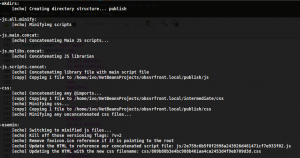Caution: Scepticism ahead!
So i’d like to share some of my experiences in the cloud since i am still trying to figure out if it its worth for me or if i am better suited with an VPS.
Maybe somebody feels like feedbackin.
I tried PHPFog for PHP and no.de by joyent for node.js.
First i have to admit: yes i only tried the free models and of course they are limited and because its free you cant expect to get it all, right?
Yes and thats true.
With PHPFog i set up an app based on symfony 1.4. After some inital problems due to some bugs on PHPFog side, i got it running.
I really like to mention the kind and immediate chat support by PHPFog. It really made me feel like dealin with humans and not only machines. Big up!
By then everything felt really smooth with git deploy, configurations, mysql setup etc.
But i had to shut down the app again, because there are restrictions to PHP which killed the app like disabling “file_get_contents for remote URLS”, probably only in the free model. But that killed it for me at that point.
So read this carefully before going to cloud: http://docs.phpfog.com/index.php/features/article/shared_vs_dedicated
I guess with dedicated hosting you get more power, sure.
Continue reading “Expeditions in the Cloud”

